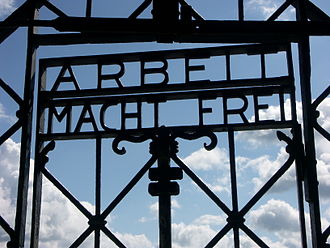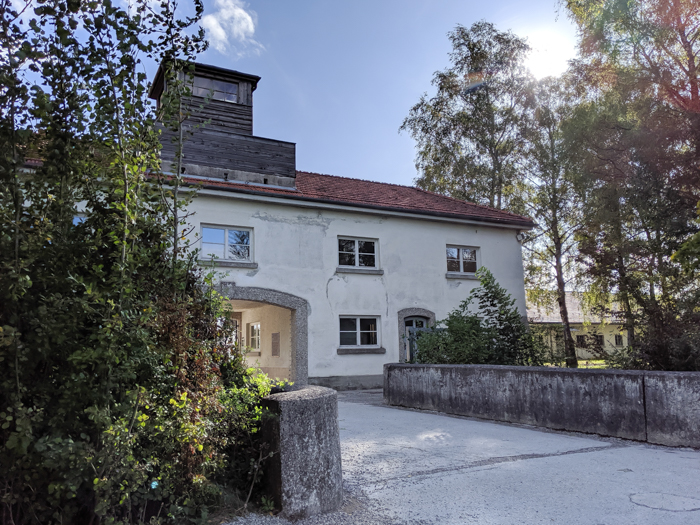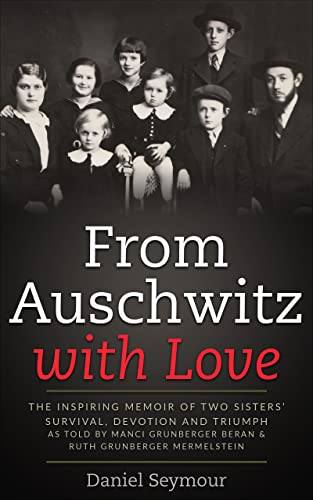We were in Munich to enjoy Robert’s Golden Apple Club winners trip and had one day left to explore the city before the Awards Banquet that evening and our homeward bound flight the next day. It was early May of 1990 and we were standing outside of the Hotel Bayerischer Hof hailing a taxi to go to a site that would forever change our view of history and of life. It would also challenge what we learned in school, or more so what we didn’t, about the people and events that took place there, now almost 90 years ago. Robert’s parents, Ralph and Ella had visited and encouraged us to go, simply saying, “It’s important.” I did wonder what we would see. But I wasn’t prepared for how I’d feel.
After two cab drivers said they didn’t know the destination, we asked our hotel concierge for help. We were puzzled. How could they not know where it was? Located just 16 km north of Munich, we arrived at 73 Alte Romerstrabe with only two hours to spare.
Walking through the Jourhaus, the only entrance to the Konzentrationslager Dachau there the prominent iron gate with words welded into it stood. “Arbeit Macht Frei” – Work Sets One Free – it read. On the other side, we made our way slowly onto the grounds taking in the enormity of the property and weight of brutality still present. To the left were two rows of barracks. We learned one row housed prisoners and the second was used for the morgue, infirmary, and penal barracks. The camp road between these buildings was lined with poplar trees, the outer perimeter lined with barbed wire.

So absorbed in reading about the people who were sent there, what their lives in the camp were like, and the path that either led them to death or freedom, I can’t remember if there were other visitors in the Museum with us. Biographies of prisoners were written on banners and historical facts about the years of operation and the Nazi Regime were listed on panels.
On March 22, 1933 soon after Adolf Hitler was appointed Reich Chancellor, this camp was set up to hold German political prisoners and over time extended to Austrians, Czechs, and those termed “undesirable” such as Jews, gypsies, homosexuals, and priests. Among the atrocities that happened over the twelve years of it’s existence were starvation, torture, and bio-chemical experimentation. 200,000 people died. All details omitted from my high school European History books and classes.
We saw the Guard Towers, Memorial Site and the Crematorium. What I felt was fear, sadness and waves of sickness. Welled-up tears finally spilled when we saw the brick ovens. All I could think of is “How could this ever have happened“?
From my journal: May 12, 1990: Redondo Beach, California
“Back from our trip…some fun memories…. some I can’t shake.”
Pictures and readings can only convey so much about Dachua Concentration Camp. Having been there and having walked the same grounds as the people who lived and died there, a much more somber and sobering understanding came over me and still does.
Just three days from now, on January 27th International Holocaust Remembrance Day will be observed. It’s the anniversary of the liberation from Auschwitz-Birkenau and is the day to honor the millions of victims of the Holocaust and to promote educational programs to prevent future genocides.
On this day, too, Amsterdam Publishers will release From Auschwitz with Love: The Inspiring Memoir of Two Sisters’ Survival, Devotion and Triumph. This book is especially meaningful to us, as one of the sisters in this story, Manci is the mother of our friend, Rhonda and her husband, Dan is the author.
One reviewer says, “This story will grip your heart, make you angry, and show you the true meaning of love.” Another says, “From Auschwitz with Love reminds us anew of hope, dedication, loyalty and heroism of Ruthie and Manci and other survivors. Their stories will continue to inspire us.”
Copies are available through Amazon Books and Barnes & Noble. To learn more about the story, please go to: http://www.fromauschwitzwithlove.com. There you will find supplemental materials (photos, diaries, Shoah interviews, links to articles & videos) that didn’t make it into the book.
It’s important to know our world history. It’s important to read books, watch movies, visit sites and engage in open conversations with others to help us remember. It’s important to not let these tragedies ever happen again.
Let us never forget. Shalom.

